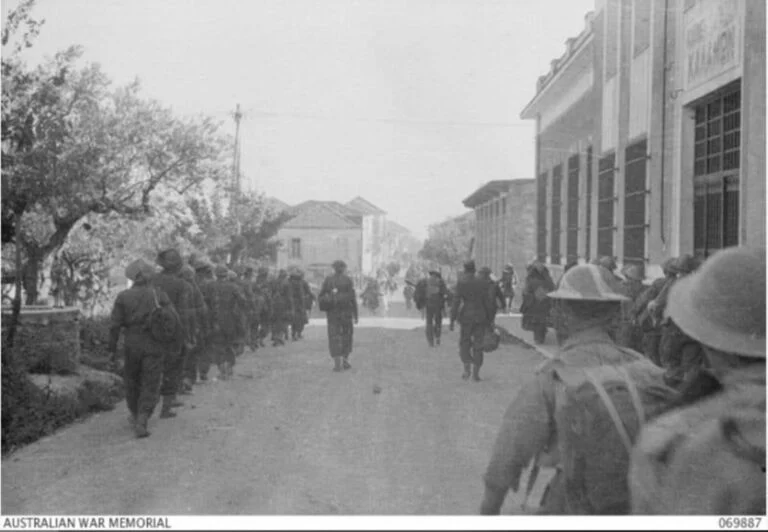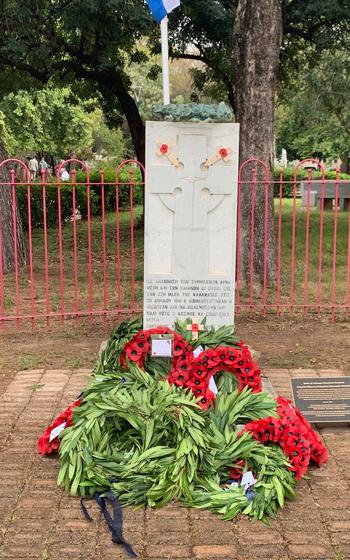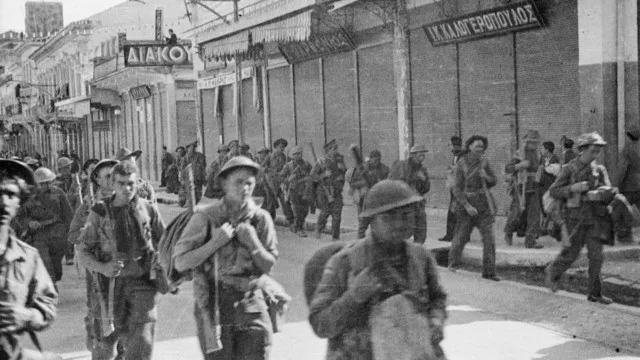*Information provided by the Society of Kalamata ‘23 March’
In early 2016 the Society of Kalamata ‘23 March’ began commemorating the Battle of Kalamata with a commemorative service for the 75th Anniversary at the Australian Hellenic Memorial. The commemorative service which has been held every year since 2016 honours the Allies and Greeks who fought and died for the defence of Greece in World War II and the courage of the civilians who risked their lives to protect the Allied troops.
By honouring the sacrifices made the friendship between Greece and Australia has grown stronger as we continue to remember the bravery and determination of those who defended Greece against the Axis forces.
We note that there will be a memorial service undertaken by the Brotherhood of Veterans of the Greek Campaign 1940-41 which will be held on Tuesday 13th May 2025 at the WW2 memorial located at the entrance to the Municipal Railway Park in Kalamata, Greece. Also there will be a Memorial Service at the National Memorial Arboretum, Lichfield on Saturday 6th September 2025 at 11.30 am in the Greek Grove, or in the chapel if wet.
History of the Campaign in Mainland Greece
On 28 October 1940, Italy invaded Greece from Albania. The intention of the modern, mechanised Italian army was a lightning campaign which would lead to the domination of the Balkans and the Aegean Sea. The Italian invasion was a failure with the ill-equipped but high-spirited and brave Greek infantry, despite not having modern weapons or equipment, successfully fighting on familiar ground to defeat the more numerous and heavily armed Italian invaders, who were forced back deep into Albania.
Going back to 1941 we recount in summary the Allies movements in mainland Greece.
In March 1941, more than 60,000 Commonwealth troops (British, Australians, New Zealanders, Indians, Palestinians and Cypriots) were sent as part of a British Expeditionary Force to support Greece, comprising the 6th Australian Division, the New Zealand 2nd Division, and the British 1st Armoured Brigade to help defend Greece from the Axis invaders.
At approximately the same time period a major Italian counterattack failed, and Germany was forced to come to the aid of its ally. The Germans invaded on 6 April 1941 in order to secure their southern flank in preparation for Operation Barbarossa, the invasion of Russia, and consequently forced the surrender of the Greek army who had for almost 6 months since the 28th of October 1940, valiantly fought and beaten the Italian invaders. This was a disaster for the retreating Commonwealth troops as they were exposed to bombing, strafing, a lack of food and shelter and constantly being pushed back with no rest.
Allied and Greek soldiers set up a defence line near the village of Vevi in central Macedonia in Northern Greece. However, they could not withstand the might of the highly modern and mechanised German army, and were soon forced to retreat to the southern ports of Greece, in the hope of evacuation by the Royal and Merchant Navy.
German fighter and bomber aircraft ruled the skies bombing and machine-gunning the Allied and Greek soldiers all the all the way, inflicting many casualties.
The Commonwealth troops fought at Vevi in central Macedonia, the Veria Pass, the Monastir valley, Servia pass, Mt Olympus, Corinth canal, Larisa, Domokos, the Pinios Gorge, Elasson, Haliacmon valley, the Vermion range, Brallos, Elatia, Thebes, Nafplion, Megara and Kalamata.

On April 12 at the historic Thermopylae Pass the second ANZAC Corps was created by the Australian Commander Blamey as the Australian and New Zealand units fought side by side as a rear guard. Like King Leonidas and the 300 Spartans they were given the order to fight at all costs and were ordered that “it is essential to deny the enemy even if it meant extinction.”
There were further desperate rearguard actions to delay and defeat the advancing German forces invading Greece. The campaign in the Peloponnese had begun with the defence of the Corinth Canal on April 1941, where Australian, New Zealand and British troops stopped German paratroops from capturing the bridge across the canal.
This led to a successful evacuation of over 52,000 Commonwealth, Greek and Yugoslav troops by sea from Athens, Megara, Nafplion and Kalamata.
By the 26th April between 18,000 and 20,000 troops were assembled at Kalamata and hid in the massive olive groves to the east of the town, out of sight of German bombers that roamed the skies during daylight hours. These included Australia, New Zealand, British and Greek troops. Amongst the British troops were around 2,000 Palestinians, Indians and Cypriots. There were also some 2,000 Yugoslav soldiers and merchant seamen from sunken transport ships – all awaiting evacuation from the Kalamata waterfront. But sadly not all of these could be evacuated, as the Allied naval evacuation force was under constant air attack, with many ships and lives being lost in the effort.
By April 28 there were still 8,000 allied troops left in Kalamata. During the day, 300 men of the British 4th Hussars, of the British 1st Armoured Brigade, had been ordered north of the town to search for the advancing enemy. They were ambushed and either killed or captured to a man.
On the night of April 28 two companies of the German 5th Panzer Division, with artillery launched a fierce attack on the town and stormed into Kalamata and got as far as the quay on Navarino Street. The New Zealand and Australian troops fought the last battle in mainland Greece in Kalamata and counter attacked with fixed bayonets, even though they had not received orders before pitching in. Some 40 Germans were killed and 100 captured. It was during this action that the bravery of Sergeant Jack Hinton of the 20th New Zealand Battalion earned him the Victoria Cross whilst Captain Albert Gray of the Australian 2/6th Battalion was awarded the Military Cross for bravery. Both Hinton and Gray would eventually be captured.
On April 29 with the Navy being unable to return and the enemy’s superior strength, the Allied Commander decided to surrender his troops to avoid further massive bloodshed. Before dawn the allied troops were ordered to destroy all weapons, equipment and anything of value prior to surrender the next day, when it would be every man for himself. The Allied troops left from the Olive groves and marched in orderly rank and file down to the beach, where they formed up in smart parade order, before the Allied Commander surrendered his men as dawn broke over Kalamata, to a German high-ranking officer. And by April 30, most had surrendered. Others chose to escape into Laconia, Koroni and Mani. Over 300 Anzacs are resting in Messinia today.
The Greek campaign ended in a German victory with the fall of Kalamata in the Peloponnese. Nevertheless, both German and Allied officials expressed their admiration for the strong resistance of the Greek soldiers. Some historians regard the German campaign in Greece as decisive in determining the course of World War II, maintaining that it fatally delayed the Axis invasion of the Soviet Union.
Whilst we commemorate the last battle in mainland Greece at Kalamata, we note that the fighting did not stop there as most of the Allied and Greek troops that were evacuated from Kalamata and the other embarkation beaches across Greece went on to defend Crete against the Axis invasion in May 1941. The vast majority of Greek forces defending Crete were regiments raised from the towns and villages of the Peloponnese.
It is important that we all remember those who served in Greece in World War 11, including those who took part in the defence of Kalamata in 1941. The bravery of Captain Gray and Sergeant Hinton and their men in that brave charge on the Kalamata waterfront should never be forgotten.
Winston Churchill stated: “the world will no longer say that Greeks fight as heroes, but heroes fight as Greeks”.
And Adolf Hitler stated: “only the Greeks, of all the adversaries who confronted us, fought with bold courage and highest disregard of death”.

Descendants of those that fought in Greece in 1941
Over the years we have had many descendants attend our Commemorative Services. We would like to thank the children and descendants of those that fought in Greece in 1941.
Rosemary Hart daughter of Brigadier Alfred Bell, OBE of the 19th Brigade. The Australian 19th Brigade were to hold the Thermopylae Pass as long as possible, allowing the other units to withdraw. Brigadier Vasey said: “Here we bloody well are and here we bloody well stay.” This was interpreted by Vasey’s Brigade Major Alfred Bell, as meaning that the brigade would “hold its present defensive positions come what may”, until the withdrawal had been completed. The Germans attacked them with the two battle groups, the 6th Mountain Division and the 5th Panzer Division on 24 April, meeting fierce resistance. The Australians and New Zealanders held out for an entire day, destroyed 15 German tanks and inflicted considerable casualties. With the delaying action accomplished, the rearguard retreated towards another defensive position at Thebes.
Catherine Bell daughter of Private Syd Grant of the 2/8 Field Regiment. He had served though the battles of Greece, including Vevi in Macedonia. Escaping from the Germans after being captured at Kalamata, Syd was eventually evacuated from the village of Trachila, south of Kalamata, after being helped by villagers for a number of days. He never forgot the support of the Greek people and after the war named his Victorian soldier settlement farm Kalamata. And our understanding is that Catherine will be donating his large World War 2 photo collection to the State Library in November.
Mr Peter Ford whose father served with the 22nd Battalion of the New Zealand 2nd Division
Mr Aron Segal whose uncle Corporal Aron Weizman of the 608 Company of the Palestine Pioneer Corps who took part in the defence of Greece and was present at the Battle of Kalamata where over 1,300 of them were taken captive.
Mr Phil Cleary the grandson of Ted Dorian of the 2/6th Battalion and the other ‘Brunswick Boys’ who fought in Greece and Crete
Quote from Australian soldier about Kalamata
Undoubtedly what many Australian soldiers took away with them from Greece was the manner in which the Greek people, who had greeted them so warmly on their arrival, did not desert them in defeat. As a detachment of the 2/3rd Battalion acted as a rearguard near the evacuation beaches at Kalamata they passed the cottage of an elderly Greek lady who stood by her door ‘with a tray of sliced cake and glasses of Retsina, a local wine’:
She offered these to each of the soldiers as they passed by, an act which touched us deeply. We could not understand what she was saying as she tearfully proffered her gifts, but her meaning was clear and we all said things like, ‘Never mind, Ma; we’ll be back and make up for all of this’.
Conclusion
It is important that we all – as Australians and as Greeks – remember those who served in Greece in World War Two, including those who took part in the defence of Kalamata in 1941. On behalf of the Society of Kalamata ‘23 March’ we thank all who have assisted and participated in honouring the sacrifices made in Greece in 1941 by both the Allied and Greek service personnel and the civilians who risked their lives to protect the Allied troops. Through the continuing Battle of Kalamata Commemorative Services we look forward to strengthening and celebrating the lasting bonds that were forged between Australia and Greece during the Second World War in Greece in 1941.
The friendship between our two countries has grown stronger as we continue to remember the bravery and determination of those Allied and Greek troops who fought in Greece and courageous civilians who risked their lives to protect the Allied troops.
The poem below was written by Buster Doug Beckett, son of Private Doug (Joe) Beckett, Royal Army Ordnance Corps who is one of the Administrators of the Brotherhood of Veterans of the Greek Campaign 1940-41. The Brotherhood was formed in the UK over 30 years ago by Edwin Horlington MBE and aims to promote awareness of the Greek Campaigns and foster communications and information between veterans and their families across the UK, the Commonwealth and all nations that served in Greece during WW2.
It is in honour of the Allied soldiers that were evacuated from Kalamata, and in particular those who fought, and those who died during the ‘Battle of Kalamata’ on the 28 / 29 April 1941. Also, for the thousands of Allied soldiers who were taken prisoners of war. May their memory live on forever.
Kalamata 1941 – A poem
The olive groves are now deserted
Weary soldiers hide there no more
Waiting for night-time and the darkness
Praying that boats will reach the shore
Kalamata was their final destination
From here they could run no more
They were battle hardened and bloodied
Bearing the battle scars of war
If only the olive trees could speak
I wonder what they would say
Having listened to their conversations
And watched as they knelt to pray
The sun still warms the olive trees
The rain still touches every leaf
The breeze still stirs the branches
I wonder if the trees can still feel their grief
The Brotherhood of Veterans
Will never let others forget
The sacrifice they made for our freedom
With brave hearts and no regret
For the soldiers who never came home
Let us pray for them and shed a tear
And for those that escaped or were captured
Remember to “Tell Them We Were Here”
